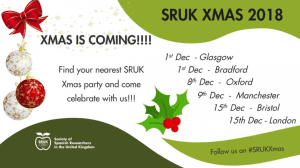- The I SRUK/CERU Cancer Symposium was organised by the Society of Spanish Researchers in the United Kingdom (SRUK/CERU), bringing together the latest innovation in cancer therapies and ageing in the UK.
- Spanish cancer researchers shared their perspectives and contributions to the cancer research field.
- This symposium attracted a multidisciplinary audience, interested in learning more about cancer research and its implications for today’s society.
Birmingham, 3rd December 2022. The I SRUK/CERU Cancer Symposium: connecting Spanish cancer researchers in the UK was organised by the SRUK/CERU Cancer Committee and the Midlands Constituency with the aim of connecting Spanish cancer researchers in the UK. This event was sponsored by the Spanish Embassy in London, and counted with the presence of Mr José María Robles Fraga, Minister Counselor for Cultural and Scientific Affairs of the Spanish Embassy in London, and Mrs Laura García Alfaya, Consul General of Spain in Manchester. During the welcome reception, both highlighted the outstanding role of Spanish researchers in the fight against cancer.
During the meeting, new therapies against different kinds of cancer including breast, prostate, lung, liver, blood, skin, bone marrow, and head and neck cancer were discussed. The morning session started with Dr Paloma García (University of Birmingham), whose research is focused on stem cell therapy and regenerative medicine and aims at designing personalised therapies according to the needs of each patient. In the words of Dr García, “we take cells from the blood of patients as model systems to decipher molecular mechanisms of the disease as well as a platform for drug screening”. Dr Cristina Montiel-Duarte (Nottingham Trent University) also indicated that studying mutations in blood cancer and prostate cancer is relevant for the identification of markers that can help predict and diagnose these types of cancer. “According to Santiago Ramón y Cajal, scientists have to be ‘inasequibles al desaliento’. And I cannot agree more. Perseverance, resilience, and the joy of doing research keep me in this career path”, Dr Montiel-Duarte added. The attention was then shifted to the environment where the tumour “resides”. In the words of, Prof Victoria Sanz-Moreno (Queen Mary University of London), “By understanding the environment, new therapeutic drugs can be developed with the aim of reducing the risk of tumour metastasis and its dissemination”. In addition, Dr Daniel Muñoz-Espin (University of Cambridge) added that “There is concluding evidence that the tumour microenvironment plays a fundamental role in cancer initiation and progression. Therefore, there is an unmet need to pharmacologically target this tumour-promoting microenvironment to improve patients’ lifestyle”. Dr Pilar Acedo Nuñez (University College London) concluded with an important message for the community of cancer researchers: “We need to make use of every opportunity to fight against cancer in the UK. We need to connect with other scientists because networking is key! It is very important to enjoy what you do and to find what keeps you motivated”.
Early-career Spanish researchers had the opportunity to share their findings with the audience and the expert researchers. This new generation of scientists shed light onto new tissue ablation techniques, irreversible electroporation (IRE), and new strategies in the genetic study of pancreatic cancer, among others. The Symposium closed with Ms Lola Manterola, founder of the CRIS Cancer Foundation, an institution that supports scientists around the world by funding research projects which pioneer novel cancer treatments. Ms Manterola explained the great labour that this foundation does to promote cancer research not only in the UK, but also in Spain, France, Switzerland, and in the USA.
This first SRUK/CERU Cancer Symposium brought together five leaders of different cancer research groups and almost 60 people interested in cancer biology and new therapies. All the speakers, organisers, and attendees agreed that this meeting was a unique opportunity to share and debate the big issues that the Spanish cancer research community is facing in the UK.




